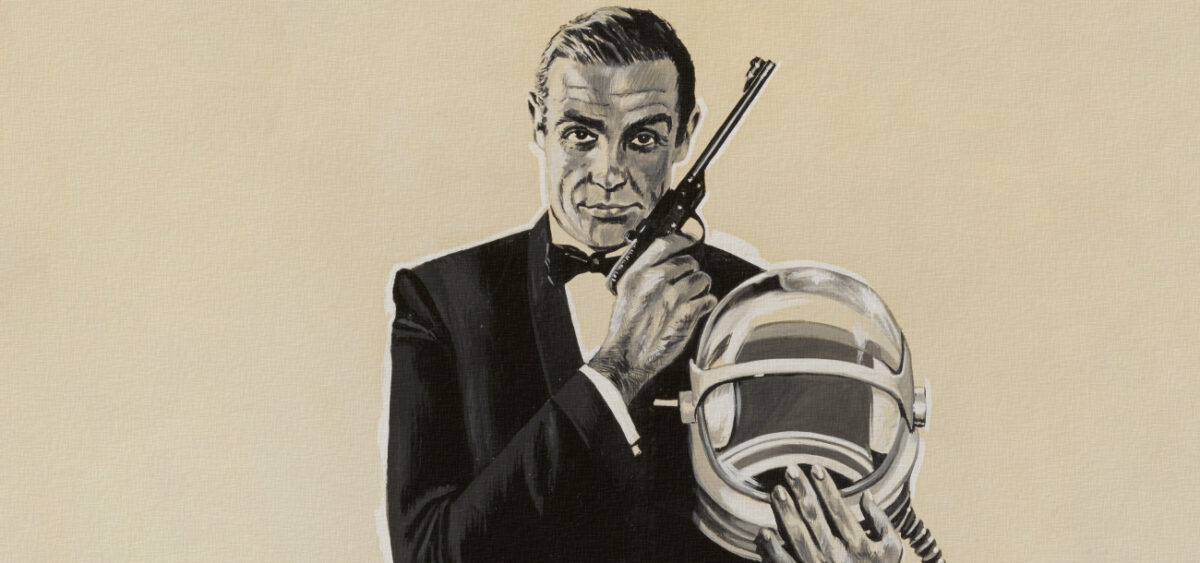
British soft power is a cogent way of conquering the hearts of foreigners. James Bond, Mary Poppins, Banksy and Manchester United are only some of the agents in Her Majesty’s service. Nowadays, they might play an even bigger role than the military. Fascination with the British royal family is common across the entire world. In the US, the last royal wedding attracted almost 30 million viewers, which is impressive given that the country was formed after a rebellion against the British monarchy. The broadcast was also a smash hit in another former colony, India. According to the editors of The Times of India, this event gathered a total global audience of 1.9 billion.
Icons of pop culture
Great Britain traditionally makes it to the very top of annual soft power rankings. In the past two years, it ranked third (2019) and second, while a year earlier it was first. The ranking is developed by the independent consulting company Brand Finance (based in London). It takes into account 30 different factors, and each country can score up to 100 points. Brand Finance defines soft power as a “country’s ability to influence the preferences and behaviours of various actors in the international arena (states, corporations, communities, publics etc.) through attraction or persuasion rather than coercion.”
Soft power rests on seven pillars: business and trade, management, international relations, culture and heritage, media and communication, education and science, as well as people and values. Indeed, except for management (Brexit and poor handling of the pandemic) and international relations (remnants of colonialism), Great Britain is among the world leaders. Its notable strength is media and communication, with a key role played by the BBC, which attracts 426 million radio listeners and television fans every week. However, the true might of Britain is revealed in culture and heritage.
“Shaken, not stirred”, “A bear of very little brain” and “To be, or not to be, that is the question” are quotations easily identified by almost anyone. Most people would also know Mary Poppins and Hogwarts, the latter an atypical school for unique children. Most of us have heard about Banksy (although few know his real identity). When asked about the recipe for a good thriller, we immediately respond with the words of Alfred Hitchcock, who argued that it “should start with an earthquake and be followed by rising tension.”
When Britain ceased to be the empire over which the sun never sets, soft power actually replaced its military. The royal family is only one element among many others, including the Rolling Stones, Jaguar, Manchester United, as well as the idea of gentlemanliness, which is quite clear to everyone regardless of gender or latitude.
The evolution of James Bond
Initially, gentlemen were the lowest ranking representatives of the gentry, or the landowning class. They would live off of their estates and rents, but would not be raised to nobility. With time, the idea of a gentlemen as the embodiment of all things British – politeness, courage, elegance, physical fitness, and often appropriate wealth – supplanted the original meaning of this term. After the social revolutions of the 19th century, it fell into almost total oblivion, as anyone could become a gentleman thanks to their refinement, manners or gestures.
The English writer Philip Mason argues that in British literature it is difficult to find a book that does not touch upon the concept of the gentleman. Although this claim may initially seem absurd, there is actually something to it. According to literary scholar Christine Berberich from the University of Portsmouth, gentlemanliness has been variously addressed – critically, mockingly, grotesquely and quite seriously – by almost all significant British writers. Jane Austen’s Pride and Prejudice, for example, features the character of Mr Darcy, who is snobbish and interested only in his own pedigree. In Emma, she created Mr Knightley, the perfect gentleman. In Charles Dickens’s Great Expectations, the young Pip owes his upward mobility only to himself (not his roots), while Rudyard Kipling went even further, sending his self-made protagonist on a series of adventures.
The figure of the gentleman is ubiquitous in contemporary British fiction, which translates into a strong cinematic presence. The example of James Bond clearly shows the transformations of the model ‘young and attractive man with ambition’. As the editors of The Irish Times argue: “Bond has always been a misogynistic dinosaur. Now he has to change.” In Thunderball, His Majesty’s special agent, played by Sean Connery, kisses a psychologist on her lips without asking for permission. In Goldfinger, he forces a girl to have intercourse with him despite her trying to strangle him. Finally, Ian Fleming himself wrote in Casino Royale about the “sweet tang of rape.”
Today’s films about 007 are no longer misogynistic, but certain scenes do border on sexism. Still, Bond has ceased to be a sexual predator, while the representation of women has also changed. Previously, they were merely ‘Bond girls’. In GoldenEye (1995), a woman was finally cast in one of the most important supporting roles: Judi Dench was chosen to play the head of the British intelligence services. It turned out that at the turn of the century, a gentleman could have a female boss. It is actually Dench who, in one scene, calls Bond a “sexist misogynist dinosaur” and a “relic of the Cold War.” In Spectre (2015), one of Bond’s partners is played by the 50-year-old Monica Bellucci. Finally, in the latest installment, a woman takes his place. What a turnaround!

Forging the elite
British colleges and universities follow the spirit of the times. In 2018, students at Oxford’s Somerville College voted to install gender-neutral toilets, naturally to the dismay and outrage of conservative tabloids. Despite their liberalism, the most famous English universities are still considered to be among the world’s best. Oxford and Cambridge rarely slump from the top 10 in the most important rankings – if at all. High positions are also typically secured by University College London and Imperial College London.
Building soft power by forging the world’s new elites and influencing their world view certainly constitutes a well-thought-out strategy. When calculating the balance of migration (deducting the number of emigrants from that of immigrants), the government does not take students into account, which means that they receive special status there. In 2019, study results were presented at the House of Lords, demonstrating that 95% of foreign students who graduate from British universities hold positive feelings about Great Britain.
The new lingua franca
The popularity of British culture is also connected with the ubiquity of the English language, whose wide reach is part of Britain’s colonial heritage. In many countries formed after the collapse of the Empire, English remained the official language, primarily because their new borders encompassed different ethnic groups, as in the case of Nigeria or India. However, it is worth remembering that this works both ways: English enjoys huge popularity because of the immensely influential character of British and American culture.
It is estimated that around 1.35 billion people speak English, with approximately 370 million native speakers. The second spot belongs to Mandarin, which is used by 1.12 billion, although most of them live in China. English, on the other hand, is used worldwide as the international language of business, art, education and politics. Shortly after Brexit, there was talk of English ceasing to be one of the EU’s working languages (the others being French and German), but it quickly turned out that this was fake news. Incidentally, this phrase – fake news – also aptly illustrates the phenomenon of English. As with every novelty, the spread of false information was given its own label in the language spoken by people all over the world, other countries eagerly borrowing it.
A mess on the map
Intriguingly, in the times when the British Empire had 412 million subjects – its territory covering 23% of the Earth’s landmass – it also tried to expand its soft power. Diplomacy and the ability to form alliances behind the scenes can be decisive, as was confirmed in October 1884, when the prime meridian was defined as passing through the astronomical observatory in Greenwich, London.
Previously, most countries had established the centre of a map (or the beginning of time) at home or at a characteristic, easily recognizable spot. Ptolemy placed the prime meridian at the western end of Europe, specifically the island El Hierro in the Canaries. Further out west, there was only the end of the world. In 1634, Louis XIII decreed that the meridian would pass through Paris. Since the French dominated the world of cartography at the time, this point of reference became widely accepted. However, as the British travelled more and more extensively beyond their own isles, they began to locate the prime meridian in London, specifically in Greenwich. With the growth of the Empire, the Greenwich meridian gained significance. Still, the French would not yield before their neighbour from across the channel and continued to orient their maps in relation to their own prime meridian. This arbitrariness created a cartographic mess, which begged for homogenization. Subsequent assemblies of the International Geographical Congress did not bring any settlement, because no one wanted to step back. In 1884, US President Chester Arthur convened the International Meridian Conference in Washington, inviting representatives of 21 independent states. Their only task was to reach consensus with regard to the prime meridian.
After several days of negotiations, the British were confident about winning the vote. Only delegates from Santo Domingo (today’s Dominican Republic) were against them, while representatives of Brazil and France abstained from voting. The rest, including the Polish cartographer and geodesist Hieronim Stebnicki, who represented Russia, agreed to vote along with the British. In their final effort, the French tabled a neutral solution, proposing to place the meridian far away from Europe and North America. However, the cards were already dealt. As a result, Poland is one hour ahead of Greenwich Mean Time (GMT). Another consequence of British domination in cartography is the adoption of nautical miles as the maritime measure of length. Perhaps if the British were more determined, Europeans would be driving on the left instead of right, which feels quite natural from their perspective.
If you must joke, do it the royal way
Finally, we turn to the famous British sense of humour, which is slightly absurd, full of sarcasm and largely self-deprecatory. In 2012, the Olympics Games turned London into the world’s capital. Most opening ceremonies at such events follow a similar pattern, with loftiness sitting right next to fireworks and laser shows, accompanied by symphonic music, which is frankly quite boring. However, the London ceremony was different, achieving cult status and receiving praise from critics, who called it “a love letter to Britain.” The full recording has as many as 17 million views on YouTube, while the highlights have almost 100 million. To compare, the 2008 opening ceremony in Beijing has 4.7 million views, while the 2016 one in Rio de Janeiro has 6.7 million. The difference is stunning!
The most popular part of the 2012 ceremony was the appearance of Rowan Atkinson. As Mr Bean, he accompanied the London Philharmonic, which performed Chariots of Fire by Vangelis. He ‘played’ an electric piano, pulling characteristic faces and doing lots of gags.
Still, the quintessence of the British sense of humour is captured in the short film Happy and Glorious, which is titled after a passage from the British national anthem God Save the Queen. The main roles are played by Daniel Craig (cast as James Bond) and the Queen herself. Screens showed Bond parking in front of Buckingham Palace, where he walked Elizabeth II, wearing a peach dress, to a helicopter, which then flew over London and finally landed at the Olympic Stadium. At the same time, a real helicopter appeared overhead and two figures jumped out, one wearing a suit and the other a peach dress. When their parachutes opened, they were revealed to be in the colours of the British flag. After they landed, the audience was asked to rise and greet Her Royal Majesty. Then, Elizabeth II entered the VIP section of the stands, naturally dressed in peach.
In Thailand or Cambodia, making fun of the king can land you in prison. In Bhutan, lese-majesty is considered religious blasphemy. What about Great Britain? The Queen can laugh at herself.
Translated from the Polish by Grzegorz Czemiel









